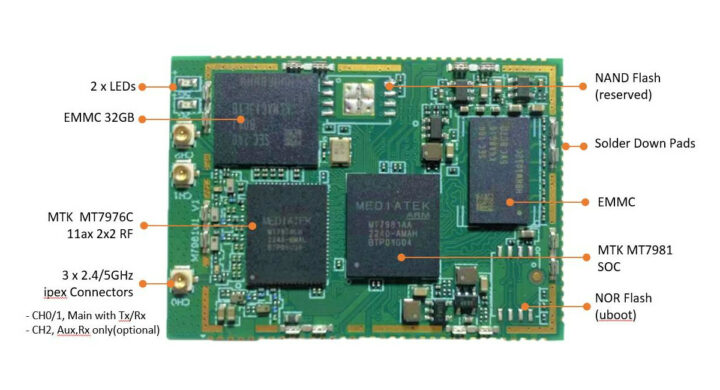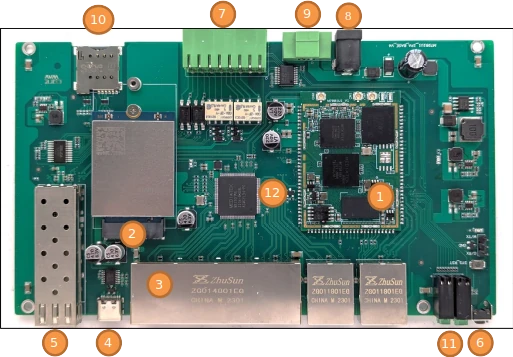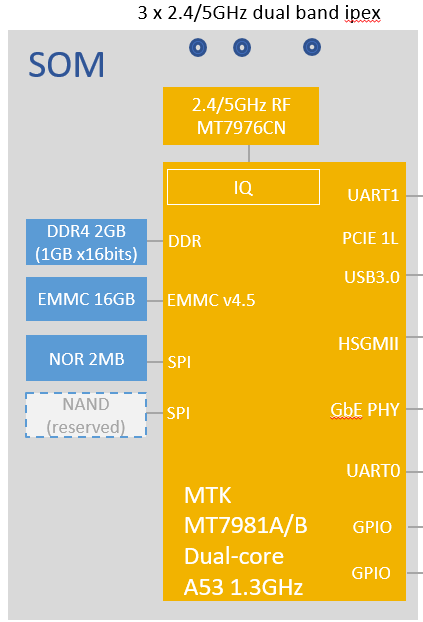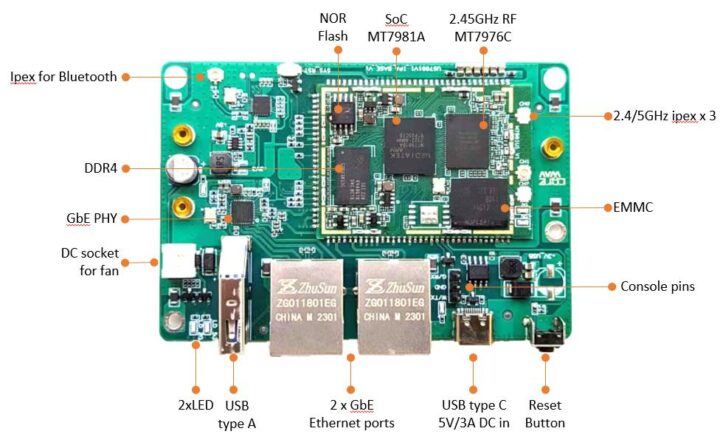Acelink SM81 is a compact (50x36mm) system-on-module based on the MediaTek Filogic 820 (MT7981A/B) processor with WiFi 6 and Ethernet connectivity designed for IoT applications such as routers, access points, and gateways.
The wireless module ships with up to 1GB DDR4 memory, a 2MB NOR flash for the bootloader, a 32GB eMMC flash for Linux or an optional NAND flash, and exposes various I/Os such as gigabit Ethernet, USB 3.0, PCIe 2.1, UART, and more through castellated holes.

Acelink SM81 specifications:
- SoC (one or the other)
- MediaTek MT7981AA (Filogic 820) dual-core processor @ 1.3 GHz
- MediaTek MT7981BA (Filogic 820) dual-core processor @ 1.3 GHz without PCIe interface
- System Memory – 1GB DDR4 @ 2133 Mbps
- Storage
- 2MB NOR flash for bootloader
- 16GB or 32GB eMMC flash for main OS (OpenWrt)
- Footprint for NAND flash
- Wireless
- Radio Mode – 2.4GHz 2×2 + 5GHz 3×3 MIMO via MT7976CN RF IC
- Radio Frequency Bands – 2412MHz ~2472MHz, 5180MHz ~5825MHz
- Transmit Power
- 2.4GHz – Up to 21dBm/MCS0
- 5GHz – Up to Max. 21dBm/MCS0
- Receive Sensitivity – -96 to -52dBm depending on the modulation scheme
- Modulation Schemes – BPSK, QPSK, 64/256/1024QAM
- Channel Size – 20/40/80/160MHz
- Data Rates
- 2.4GHz
- 802.11b: 1, 2, 5.5, 11Mbps
- 802.11g: 6, 9, 12, 18, 24, 36, 48, 54Mbps
- 802.11n: up to 300Mbps – 2×2 MIMO
- 802.11ax: up to 573.5Mbps – 2×2 MIMO
- 5GHz
- 802.11g: 6, 9, 12, 18, 24, 36, 48, 54Mbps
- 802.11n: up to 450Mbps – 3×3 MIMO (40MHz channel)
- 802.11ac: up to 1300Mbps – 3×3 MIMO (80MHz channel)
- 802.11ax: up to 3,603Mbps – 3×3 MIMO (160MHz channel)
- 2.4GHz
- Antennas – 3x IPEX connectors
- Interfaces via castellated holes
- Networking – Gigabit Ethernet, HSGMII/SGMII+
- USB – 1x USB 3.0 Host
- Expansion – PCIe 2.0 (MT7981AA only)
- 2x UART (1x Tx/Rx1 + 1x 4-pin UART)
- WPS
- Shared GPIOs
- Security – AES-CCMP, GCMP hardware processing
- Misc – Hardware watchdog, system reset
- Supply Voltage – +3.3V DC
- Power Consumption – 8W typ.; up to 11W with full Tx
- Dimensions – 50 x 36 x 3.0 mm
- Weight – About 20 grams
- Temperature Range – Operating: -10°C to +70°C; storage: -40°C to +90°C
- Humidity – 5% – 95% (Non-condensing)
Acelink says the module can run OpenWrt 23.05 or Debian 11.8 BullsEye with Linux 5.15. It features the same MediaTek Filogic 820 processor as found in the Brume GL-MT2500/GL-MT2500A security gateway/router and the upcoming OpenWrt One router board designed by the OpenWrt community, but the SM81 module is fitted with higher capacity storage enabling it to comfortably run a full-featured Linux distribution like Debian.
Acelink also provides the SM81 EVK-AP for evaluation with two Gigabit Ethernet RJ45 ports, a USB 3.0 Type-A port, a USB-C port for 5V/3A DC input, and a reset button.

That’s if you want to make a router. However, if the plan is to create a cellular IoT gateway, the company also provides the SM81 EVK-LTE with an M.2 Key-B socket compatible with 4G LTE modules and two micro SIM card slots.

The EVK-LTE evaluation kit is also equipped with six gigabit Ethernet ports connected through a MediaTek MT7531 switch, an SFP cage, a USB 3.0 Type-C port for console access, an RS232/RS422/RS485 terminal block, and a 3-pole terminal block for DC power.
Acelink provides some pricing info with the SM81 Filogic 820 system-on-module going for $39 in 32GB flash/1GB RAM configuration, while the EVK-AP sells for $99. I was not provided with pricing for the EVK-LTE kit. While I got most of the information above from a Word file, a few more details may also be found on the product page which has a few mistakes here and there…

Jean-Luc started CNX Software in 2010 as a part-time endeavor, before quitting his job as a software engineering manager, and starting to write daily news, and reviews full time later in 2011.
Support CNX Software! Donate via cryptocurrencies, become a Patron on Patreon, or purchase goods on Amazon or Aliexpress







Are you sure about those WiFi specs?
I have a MediaTek MT7981B 5G/LTE gateway and it does 2400Mbps 5ghz and 600Mbps 2.4ghz.
The specs might be consistent if your router is 2×2 MIMO at 5 GHz, while the module here supports 3×3 MIMO at 5 GHz. 600 Mbps could be a rounding up of 573.5Mbps.